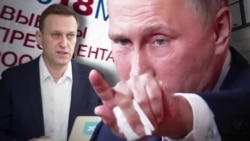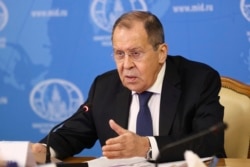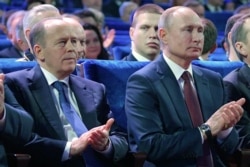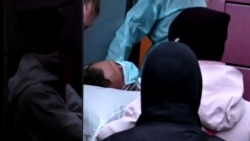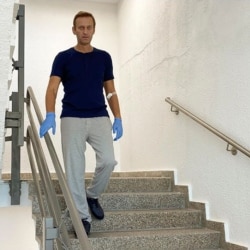On October 26, Russian Foreign Minister Sergei Lavrov spoke with the Croatian newspaper Večernji list on a range of issues regarding Moscow’s strained relations with Western powers.
When asked about Moscow’s alleged role in the August 20 poisoning of anti-corruption campaigner Alexey Navalny on Russian soil, Lavrov accused the United States and European Union of “redoubling their efforts to curb Russian development” and “punish” Moscow for pursuing “an independent foreign policy” and protecting its “national interests.”
“To justify their actions, the introduction of new anti-Russian sanctions, they come out with various accusations and insinuations, including the ones you mentioned. All this, of course, without any facts or evidence,” Lavrov said.
He continued: “Instead of respecting [the 1959 Council of Europe Convention on Mutual Legal Assistance in Criminal Matters], the representatives of Germany and France have initiated another series of illegitimate EU sanctions against Russian citizens. All this sadly and clearly illustrates the inability of the European Union to adequately assess world events and their desire to put themselves above the law.”
The assertion that German and French sanctions are illegal is false.
On October 6, the Organization for the Prohibition of Chemical Weapons (OPCW) confirmed that Navalny had been poisoned by a nerve agent from the Novichok group, which was developed by the Soviet Union and later the Russian Federation. Such military grade chemical agents are banned under the Chemical Weapons Convention, to which Russia is a party.
That OPCW conclusion reinforced findings released by the German government after Navalny was airlifted to Berlin for treatment in August. A nerve agent from the Novichok group was also used in a 2018 attack on Russian double Agent Sergei Skripal and his daughter Yulia in England; British national Dawn Sturgess died after being exposed to the chemical.
That the version of Novichok used in the Navalny attack was not listed on the OPCW’s Annex on Chemicals to the Convention has led critics to charge that Russia is continuing to develop new chemical weapons in violation of its treaty obligations. Russia has denied that.
Following the OPCW findings, on October 15, the EU and U.K. imposed sanctions on a Russian research institute and six Russian nationals, including Alexander Bortnikov, the chief of Russia’s Federal Security Service (FSB), and Sergei Kiriyenko, President Vladimir Putin’s deputy chief of staff.
Ian Hurd, director of the Weinberg College Center for International and Area Studies at Northwestern University, says Lavrov is wrong about the legitimacy of the German and French sanctions.
“Legitimacy is in the eyes of the beholder, and Russia’s complaint that Germany is behaving illegitimately does not carry any weight — the Russian government is simply asserting its own desire to be left alone to punish its political opponents without outside condemnation,” he said.
Hurd said that sanctions imposed by the EU or Germany are governed by their respective laws, not Russian law. Any recourse sought by the sanctioned individuals/institutions would likewise be governed by those state entities.
“The EU sanctions are imposed pursuant to EU regulations regarding the use of chemical weapons, and they identify these individuals and Russian institutions as having violated EU rules on the use of chemical weapons,” he said. “These are administrative measures of the EU, not a criminal case and not an international legal case, and the sanctions do not rely on proving a crime in court.”
Hurd noted that these sanctions apply to the operations of individuals and organizations in the EU, whether they are frozen bank accounts or forbidding travel, and therefore “do not amount to the extra-territorial application of EU law.”
Meanwhile, Moscow has vowed to respond to the sanctions, claiming no evidence has been provided showing the involvement of the Russian suspects in the poisoning.
Russia has gone so far as to dispute a poisoning occurred at all, claiming that Russian doctors found no toxic substances in Navalny’s body prior to being airlifted to Germany.
Lavrov specifically criticized what he called “the arrogant refusal of Berlin to respond to the numerous requests of our Chief Prosecutor's Office in the so-called Navalny case,” which he claims “directly violates Germany’s obligations under the 1959 Council of Europe Convention on Mutual Legal Assistance in Criminal Matters.”
In multiple cases, Russia on has requested all information related to the matter, including medical data, biomaterials test samples and examination results. Germany counters it has done everything necessary to help answer Russia’s questions.
Joseph Hinterseher, a spokesperson of Germany’s Federal Foreign Office, told Polygraph.info that the use of a military grade nerve agent “is a breach of an international norm and thus not a bilateral issue.”
He said that Russia, a contracting party to the Chemical Weapons Convention (CWC), had yet to explain “the grave breach of the CWC on its territory.”
“The EU has decided to sanction individuals who can be held responsible for the breach of the CWC due to their official functions. Germany and the EU continue to call on Russia to explain this breach and the attempted murder of a member of the political opposition,” said Hinterseher.
As for the 1959 Council of Europe Convention on Mutual Legal Assistance in Criminal Matters, Hurd said that it gives “broad discretion” for governments on whether they may opt to share evidence.
“Article 2b says ‘Assistance may be refused: … if the requested Party considers that execution of the request is likely to prejudice the sovereignty, security, [public order] or other essential interests of its country.’ This would seem to insulate Germany and others from any claim that it has neglected obligations under the treaty,” Hurd said.
He also pointed to a landmark case brought before the Court of Justice of the European Union, Kadi v. European Commission II (2013), in which the “overriding” security considerations of the European Union, its member states or the conduct of international relations, could “preclude the disclosure of some information or evidence to the person concerned.”
On August 20, Navalny became violently ill on a flight from Tomsk to Moscow, prompting an emergency landing in Omsk. On August 22, he was transported to Berlin for further treatment. On September 2, the German government said it had unequivocal evidence Navalny was poisoned with the nerve agent Novichok, a finding that would later be confirmed by French and Swedish labs, as well as the OPCW.
After weeks in a medically induced coma, on September 15 Navalny posted a picture to his personal Instagram page showing him awake and sitting up in a hospital bed. He was discharged from hospital one week later.
On October 30, Navalny returned to his popular YouTube show via video link in Germany. It was his first appearance since the poisoning occurred.
He has vowed to return to Russia one his health improves.
Navalny has filed a complaint with the European Court of Human Rights over Russia’s refusal to open a criminal case into the poisoning, arguing its refusal to investigate violates his right to life.




